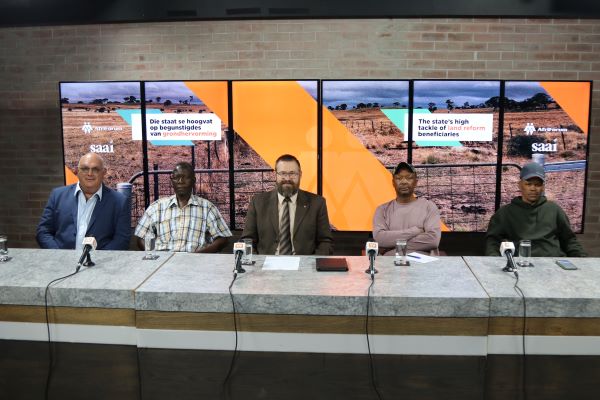
Saai is assisting some of its members who are beneficiaries of the land redistribution program to get ownership of the farms they rent. The land reform program in Dr Theo de Jager, South Africa has failed miserably, and the state has not yet succeeded in creating a class of profitable black farmers despite billions of rands spent on it over the past 28 years.
According to Dr Theo de Jager, Chairperson of the Board of Saai, beneficiaries of the redistribution program are doomed to the eternal status of sub farmers because they have to rent their land from the state. They are at the mercy of the nepotism, maladministration, fraud and inefficiency of the state, which makes it almost impossible for a black farmer to succeed as a farmer and perform commercially.
Whiskey Kgabo, who has been farming in the Letaba district for 38 years, is harassed by trespassers daily. The police refuse to act because, according to them, the Department of Agriculture, Land Reform and Rural Development created the problem and must solve it. As a tenant of government land, he cannot invest millions of rand in fencing and security on the farm because he does not know if he may stay on the farm. He must first obtain certainty that he may reside on the farm by purchasing it before getting security for agricultural financing.
Vuyani Zigana has been moved from one farm to another numerous times, either because the department wants to give his rental farm to a well-connected cadre or because several other beneficiaries have to share the same farm, and the officials were not aware of the existing tenants.
According to Francois Rossouw, CEO of Saai, uncertainty about the renewal of contracts and the integrity of the state’s leases are some of the most critical obstacles in the successful development of farmers. “Farming is a long-term investment,” he says. “Private ownership of agricultural land is the most common element that successful agricultural countries have in common and lies at the basis of investment attractiveness and wealth creation.”
Johannes Bezuidenhout, who farms in the Moordenaarskaroo near Beaufort-West, is discouraged by the administrative red tape in the department. He has been waiting ten months for the extension of his lease to be ratified, but the provincial officials did not sign off on it. He can no longer sink boreholes, build troughs, or expand because officials have already hinted that they want to give part of his farm to someone else.
De Jager says farm ownership is crucial for farmers’ successful development. A farm is a business, and investor certainty is as essential as in any other business. The farmer is the most important investor on a farm, and if he does not have certainty of land use, farming and the local economy suffer. That is why Saai is putting increasing pressure on the state to give upcoming farmers title deeds or to allow them to buy their farms.








The South African Government creates barriers for successful farming especially on small scale farmers that hope to grow into commercial farmers. Late delivery of support inputs to farmers is common. Today selective farmers chosen unfairly some not even farming received 2 or more bag s of fertilizer. What do you do with one or two bags anyway? Corrupt officials in Mpumalanga , I think, have pushed to the cancellation of vouchers that were given to farmers. With vouchers farmers received up to 40 bags of fertilizers. They wanted to buy for farmers. A long the way a lot is stolen. From 40 bags to 1 bag of fertilizer. How sure are We that the minister decided to give a farmer 1 bag of fertilizer? Whom do we ask? We are told it was meant for dry land. Throughout the year we received no assistance as a developing farmers on the irrigation scheme from Mpumalanga. I struggle on my own. Anyway true freedom is based on self-reliance as an output. I made a paradigm shift from dependency to self-reliance and hope this approach will accelerate my progress towards becoming a commercial farmer and tell my story while motivating youth on how to pick up in farming without any support from the Department of Agriculture. My personal goal is to contribute to food security and produce more do that food prices can drop down and ensure that the poorest families can also afford to eat healthy vegetables and have a daily nutritious diet on their plate. My second goal is to develop more youth in practical farming before I reach pensionable years. If you want farming land approach the traditional authorities. They are reliable. They will avail land to you and yours will be to solve the water problem and create employment while contributing positively to the growth of our economy in order to relive the poor from struggling with high food prices. However I’m not saying the Government is bad. All I know the bureaucratic chain in the Government has a lot of problems. Corruption is rife and it seems ending it us insurmountable to the South African Government.
Comments are closed.